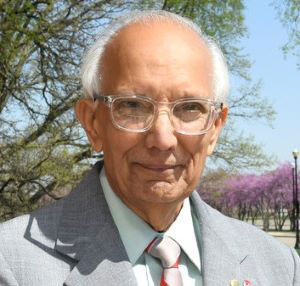Noted soil chemist to talk about climate-resilient agriculture March 26
Lal featured during 39th Roscoe Ellis lecture at K-State
At a glance: Rattan Lal, a pioneer in soil-centric agricultural management to improve food security globally and a leader in developing climate resilient agriculture, will give the 2024 Roscoe Ellis, Jr. Lecture in Soil Science.
More information: Nathan Nelson, 785-532-5115, nonelson@ksu.edu
Related: Roscoe Ellis, Jr. Lectureship | K-State Department of Agronomy
March 15, 2024
By Pat Melgares, K-State Research and Extension news service
MANHATTAN, Kan. – Rattan Lal, a pioneer in soil-centric agricultural management to improve food security globally and a leader in developing climate resilient agriculture, will give the 2024 Roscoe Ellis, Jr. Lecture in Soil Science at Kansas State University on March 26.
 Lal’s talk – Sustainable Agriculture and Soil Management for Climate and Food Security – will begin at 4 p.m. in Regnier Forum in K-State's Regnier Hall.
Lal’s talk – Sustainable Agriculture and Soil Management for Climate and Food Security – will begin at 4 p.m. in Regnier Forum in K-State's Regnier Hall.
There is no cost to attend.
Lal is currently the Distinguished University Professor of Soil Science at The Ohio State University, and director of that university’s Rattan Lal Center for Carbon Management and Sequestration.
At right: Rattan Lal | Download this photo
“Dr. Lal’s visit is a unique opportunity for the K-State community to engage with a preeminent expert in soil science, carbon management and sustainable agriculture,” said Nathan Nelson, a soil scientist and professor in K-State’s Department of Agronomy.
Carbon sequestration is a natural or artificial process by which carbon dioxide – a colorless and odorless gas – is removed from the atmosphere and held in solid or liquid form.
“The carbon cycle, including carbon sequestration, is an important component in increasing agricultural resilience to future climate change, improving agricultural sustainability and moving toward regenerative agriculture systems,” Nelson said.
He adds: “Understanding how our management (on the farm) impacts carbon cycling and its subsequent effects on the plant nutrient cycle will help us reduce nutrient inputs and losses, and improve the overall nutrient cycling efficiencies in crop production. This will translate to long-term benefits of reduced production costs, greater net returns and cleaner air and water for Kansas.”
In addition to his positions at Ohio State, Lal is currently an adjunct professor at the University of Iceland and the Indian Agricultural Research Institute; and a visiting professor at Pontifical Catholic University in Valparaiso, Chile. Among numerous awards, he was the recipient of the 2020 World Food Prize, and the 2019 Japan Prize.
His work in climate resilient agriculture includes soil carbon sequestration, sustainable intensification, enhancing the use and efficiency of agro-ecosystems, sustainable management of soils, and soil health.
His current research focuses on soil carbon dynamics and global warming; soil structure and its management; soil erosion and the fate of carbon transported by erosional processes; soil wetness and anaerobiosis; and sustainable management of soil and water resources.
Raj Khosla, head of K-State’s Department of Agronomy, called Lal’s lecture “an excellent opportunity for our students, staff, faculty members and the community to engage, listen and learn and be inspired by Dr. Lal and his work.”
This year’s lecture marks the 39th year of the Roscoe Ellis, Jr. Lectureship in Soil Science at K-State, which was established to advance soil science at the university by attracting prominent scholars to interact with students and faculty.
Roscoe Ellis, Jr. was a prominent K-State faculty member who is remembered for his dedication, knowledge and helpfulness to students and the soil science community.
More information on the lecture series is available online at https://www.agronomy.k-state.edu/about/news-and-events/lectureships/ellis-lectureship/.
***

K‑State Research and Extension is a short name for the Kansas State University Agricultural Experiment Station and Cooperative Extension Service, a program designed to generate and distribute useful knowledge for the well‑being of Kansans. Supported by county, state, federal and private funds, the program has county extension offices, experiment fields, area extension offices and regional research centers statewide. Its headquarters is on the K‑State campus in Manhattan. For more information, visit www.ksre.ksu.edu. K-State Research and Extension is an equal opportunity provider and employer.